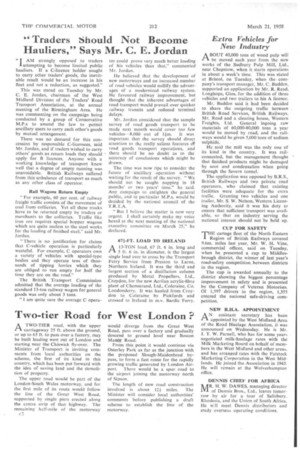"Traders Should Not Become Hauliers," Says Mr. C. E. Jordan
Page 38

If you've noticed an error in this article please click here to report it so we can fix it.
" IAM strongly opposed to traders attempting to become limited public hauliers. If a C-licence holder sought to carry other traders' goods, the inevitable result would be an increase in his fleet and not a reduction, as suggested."
This was stated on Tuesday by Mr. C. E. Jordan, chairman of the West Midland Division of the Traders' Road Transport Association, at the annual meeting of the Birmingham Area. He was commenting on the campaign being conducted by a group of Conservative M.P.s to amend the law to permit ancillary users to carry each other's goods by mutual arrangement.
There was no demand for this concession by responsible C-licensees, said Mr. Jordan, and if traders wished to carry others' goods as return loads they should apply for B licences. Anyone with a working knowledge of transport knew well that a degree of empty running was unavoidable. British Railways suffered from this unbalance of transport as much as any other class of operator.
Rail Wagons Return Empty "For example, 60 per cent, of railway freight traffic consists of the movement of coal from collieries. Yet all these trucks have to be returned empty by traders or merchants to the collieries. Traflic like iron ore requires special hopper wagons which are quite useless to the steel works for the loading of finished steel," said Mr. Jordan.
"There is no justification for claims that C-vehicle operation is particularly wasteful. For example, C operators own a variety of vehicles with special-type bodies and they operate tens of thousands of tipping lorries which they are obliged to run empty for ,half the time they are on the road."
The British Transport Commission admitted that the average loading of the standard 13-ton railway wagon for general goods was only about 3 tons.
"I am quite sure the average C opera tor could prove very much better loading of his vehicles than that." commented Mr. Jordan.
He believed that the development of new motorways and an increased number of road vehicles would nullify the advantages of a modernized railway system. He favoured railway improvement, but thought that the inherent advantages of road transport would prevail over quicker railway transits and reduced terminal delays.
Mr. Jordan considered that the sample survey of road goods transport to be made next month would cover too few vehicles-8,040 out of lfm. It was important that the survey should direct attention to the really salient features Of road goods transport operations, and there should be no doubt as to the accuracy of conclusions which might be drawn.
The time was now ripe to consider the future of ancillary operation without waiting for the result of the survey. "We should not be caught napping in 18 months' or two years' time," he said. Any campaign to enlighten the general public, and in particular M.P.s, would be decided by the national council of the T.R.T.A.
" But I believe the matter is now very urgent. I shall certainly make my voice heard at the next meeting of the national executive committee on March 25," he declared.
674-FT. LOAD TO IRELAND
A13-TON load, 67 ft, 6 in. long and 5 ft. 6 in. in diameter, is the largest single load ever to cross by the Transport Ferry Service from Preston to Larne, Northern Ireland. It was the third and largest section of a distillation column produced by Metal Propellers, Ltd.. Croydon, for the new Acrilan acrylic-fibre plant of Chemstrand, Ltd., Coleraine, Co. Londonderry. It was hauled from Croydon to Coleraine by Pickfords and crossed to Ireland in m.v. Bardic Ferry.








































































































